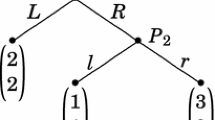Summary. We apply Camerer and Ho's experience-weighted attraction (EWA) model of learning to extensive-form signaling games. Since these games often have many equilibria, logical `refinements' have been used to predict which equilibrium will occur. Brandts and Holt conjectured that belief formation could lead to less refined equilibria, and confirmed their conjecture experimentally. Our adaptation of EWA to signaling games includes a formalization of the Brandts-Holt belief formation idea as a special case. We find that the Brandts-Holt dynamic captures the direction of switching from one strategy to another, but does not capture the rate at which switching occurs. EWA does better at predicting the rate of switching (and also forecasts better than reinforcement models). Extensions of EWA which update unchosen signals by different functions of the set of unobserved foregone payoffs further improve predictive accuracy.
Similar content being viewed by others
Author information
Authors and Affiliations
Additional information
Received: April 26, 1999; revised version: April 25, 2000
Rights and permissions
About this article
Cite this article
Anderson, C., Camerer, C. Experience-weighted attraction learning in sender-receiver signaling games. Econ Theory 16, 689–718 (2000). https://doi.org/10.1007/PL00020948
Issue Date:
DOI: https://doi.org/10.1007/PL00020948




